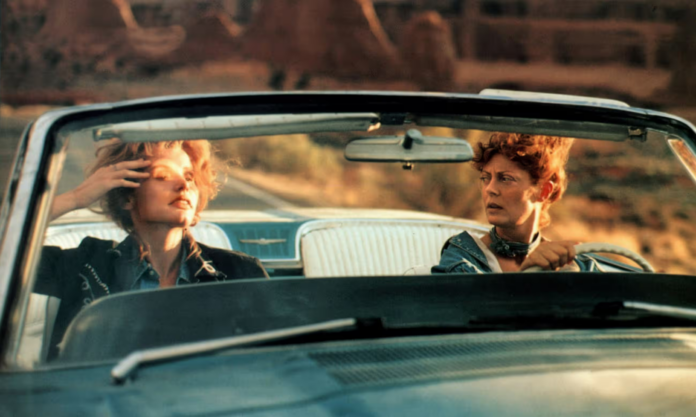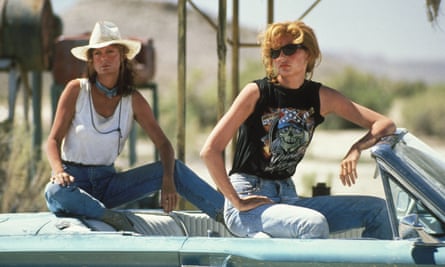
Susan Sarandon and Geena Davis star as female outlaws trapped in a patriarchal world in a film that remains a biting outlier
Thelma & Louise has lost none of its bite, even after 30 years.
When the film was released in 1991, it unleashed a wave of controversy that seemed to take its cast and crew by surprise. Geena Davis and Susan Sarandon appeared on the cover of Time magazine, under the coverline “Why Thelma & Louise Strikes A Nerve”; the particular nerve that it struck was much debated. Was it, as some critics felt, a thoughtlessly violent movie that saw two women committing terrible crimes in the name of “empowerment”? Were they “acting like men” under the cover of feminism? Or was it in fact misandry, unfair to men, because it portrayed all of its male characters as awful? (Never mind that they are not all awful; it’s a pre-hashtag #NotAllMen). Were they role models? Was it a feminist parable? Was that ending, one of the few that has truly earned the overused adjective “iconic”, perfect, or a cop-out? In The Last Journey, a 2002 documentary about the making of Thelma & Louise, Sarandon addressed all the noise, and said: “Films at their best should challenge your perspective.” This is film at its best.
…
It has left a cartoonish mark on the landscape of pop culture, which is a testament to its brilliance, but the film itself is much more complex than its familiar image. There is plenty about it that remains audacious, but still now, I think one of the boldest decisions taken by writer Callie Khouri and director Ridley Scott is to let it be funny, despite the weight of some of its storylines. It is quick, sarcastic, even silly. Thelma tells Louise to shoot the cop’s radio, she blows out the one playing music in his car. Darryl, Thelma’s grotesque, preening, deadbeat husband, is so incapable of talking to her nicely that when he answers the phone with a pleasant “Hello”, she immediately knows he’s being watched by the police. “My husband wasn’t sweet to me,” she tells the sexist truck driver who crudely heckled her and Louise on the road, “and look how I turned out.”
There is an obscene number of air-punch moments like this (see also: “Go fuck yourself, Darryl”), though brilliantly, Khouri always leads the audience into a kind of moral murk. Thelma is famously robbed by Pitt’s JD, though he has given her fair warning that he is a robber. He leaves her with the gift of his criminal playbook, and she turns out to be really very good at a life of crime. It is satisfying to watch her stick up a store, charmingly, with the exact lines JD gave her. But is her choice to commit armed robbery worse than Louise’s spontaneous decision to shoot Harlan in the heart? Should they blow up the moron’s truck? Is it cathartic? Is it earned? Films, at their best, should challenge your perspective.
…Davis and Sarandon have often spoken about the scarcity then and since of women being in the driving seats of their own stories. “It’s not too often you get to play an outlaw as a woman,” Sarandon once said. Thelma & Louise was supposed to open the floodgates to more women opening movies, but it didn’t. It remains an outlier. Davis has dedicated the later part of her career to fighting for gender equality on screen.

It is an obvious line to draw, but it is difficult not to view Thelma & Louise through a #MeToo lens. There are very recent shows and films that bear its influence, whether deliberately, or by osmosis, from Promising Young Woman to I May Destroy You. In part that is the subject matter. They all deal with the aftermath of sexual assault. But it is also because of their ambiguous morality. “I’ll say he raped me and you shot him. That’s close to the truth,” says Thelma, looking for a way out of their fugitive state. But it isn’t the truth. Louise does not kill the odious Harlan because he is raping Thelma. She shoots him when the pair are walking away. She shoots him because he isn’t sorry, hasn’t calmed down, is angry that Louise stopped him, and because he calls her a bitch. Khouri lays breadcrumbs of Louise’s traumatic backstory without ever being too obvious; something terrible happened to her, and there’s no doubt that her split-second decision to pull that trigger has its roots in Texas. It is a character study in PTSD.
Besides, Louise is too world-wise to think that anyone would believe them, even if they did tell the police their version of what had happened. A bar full of people saw Thelma dancing cheek to cheek with the dead man. Nobody would accept that he attacked her. “We don’t live in that kind of world, Thelma!” says Louise. After 30 years, we still don’t live in that kind of world. When the pair are still planning their weekend trip, not knowing that it will be their last, Louise gently chastises Thelma for putting up with Darryl. “You are what you settle for,” she says. The greatest legacy of Thelma & Louise is a reminder not to settle. It still strikes a nerve.
-Nicholson, R. (2021, May 24). Thelma & Louise at 30: A groundbreaking road movie that still strikes a nerve. The Guardian. https://www.theguardian.com/film/2021/may/24/thelma-and-louis-susan-sarandon-geen-davis
I’ve left this article mostly in-tact because it perfectly encapsulates what is important about this movie. Thelma & Louise completely redefined the buddy road trip movie, flipping it on its head in order to discuss real world feminist issues with wit, care, and humor. Reading this article makes me want to watch it again, and I highly recommend this movie to anyone. My stepmom is someone who loves to travel, going on road trips across the country by herself, just her and the minivan my dad converted for her. Although she is always having friends fly out to meet her and she is rarely actually by herself, I am often reminded of Thelma & Louise. It worries me not that my stepmom could become an outlaw, obviously, but that she could encounter the dangerous men depicted in the film. Clearly the male characters are exaggerated, but the roles they represent still ring true to this day.
I’d like to redefine the car through design just as Thelma & Louise redefined the road trip movie. The car can be strong and feminine, and these descriptors do not have to be mutually exclusive. The car in the film doubles as a symbol of freedom in both the conventional sense as well as the liberation of the two lead women. I’d like for more women to feel that freedom.



